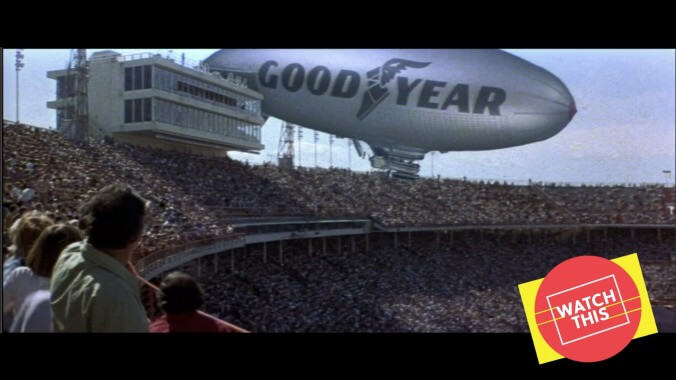Before he unleashed Hannibal Lecter, Thomas Harris floated a bomb into the Super Bowl

Watch This offers movie recommendations inspired by new releases, premieres, current events, or occasionally just our own inscrutable whims. This week: With a new Tom Clancy movie, Without Remorse, premiering on Amazon Prime, we’re looking back on other Hollywood adaptations of mass paperback novels, a.k.a. so-called airport fiction.
Black Sunday (1977)
John Frankenheimer’s mid-career political thriller Black Sunday opens with a familiar scene. A woman gets out of a cab in a crowded Middle Eastern marketplace, her sunglasses and scarf marking her as someone who doesn’t want to be seen. She pushes through dense crowds in narrow passageways, past booths selling spices, copper teapots, and other items meant to serve as symbols of exotic otherness to American audiences. Once she reaches the other side, she hails another cab, and continues on to her final destination. It’s missing the yellow filter, but other than that, the sequence could be taken from any number of 21st-century spy movies.
When it was released in 1977, Black Sunday stood on the precipice of two cinematic trends: the disaster movie, which had peaked with the release of The Towering Inferno in 1974, and the terrorism thriller. The latter genre was still coalescing at the time, and Black Sunday sits midway between the apolitical lone wolves of the early ’70s and the Russian and Arabic stereotypes who stoked xenophobic fears throughout the ’80s, ’90s, and beyond. Inspired by the attack on the Munich Olympics in 1972, author Thomas Harris’ source novel combines a real sporting event (the Super Bowl) and a real militant group (Palestinian radicals Black September) for a fictional plot to weaponize the Goodyear Blimp. It’s concocted by two outsiders: traumatized Vietnam vet Lander (Bruce Dern) and German-Palestinian guerilla fighter Dahlia Iyad (Marthe Keller). For Frankenheimer’s part, he insisted that this was not a political movie, saying, “It’s no more a film about the Mideast crisis than it’s a film about football.”
Dern’s performance is a highlight, supplying a damaged human dimension to what otherwise plays like a procedural—albeit one that spends significant time with players on both sides of the law. You can tell that Black Sunday was based on a page-turner, as the story jumps between continents, characters, and plot points to examine the preparations and negotiations undergone not only by Lander and Iyad but also the lawmen chasing them. There’s a moral ambiguity to Black Sunday’s depiction of terrorism that’s very pre-9/11; this film can easily be read as a case study in how American foreign policy pushes people to hate, and how blind loyalty to a cause can obscure the humanity of all involved. Midway through the film, Mossad agent Kabakov (Robert Shaw) tells a colleague, “You’ve come to see both sides of the question. That’s never good.” But Black Sunday forces the audience to see both sides.
The extended buildup of this 143-minute film gives added resonance to its expertly crafted finale, a tense sequence filmed at the actual Super Bowl X in Miami that culminates in a panicked melee reminiscent of celebrated disaster films like 1970’s Airport. Frankenheimer’s staging and editing in this sequence are designed for maximum nail-biting efficiency. Take the shot of Shaw looking out over a crowd of 80,000 people, scanning it for danger. The camera pans up to the Goodyear Blimp, which, unknown to the oblivious agent, has been outfitted with hundreds of kilos of plastic explosives and metal darts designed to kill as many people as possible. The special effects have not aged well, but the suspense of that last half hour is as potent as ever.
Despite its impressive scope and Hollywood pedigree—the film was produced by the legendary Robert Evans, who called it “a disappointing success”—Black Sunday made only modest box-office. Its bravura finale lives on, however, in two more pieces of political pulp, Tom Clancy’s The Sum Of All Fears and Christopher Nolan’s The Dark Knight Rises, both of which took direct inspiration from Black Sunday. But perhaps the film’s most impactful, if subtle, legacy is this: The sale of the film rights to Black Sunday allowed Harris to quit his day job as a journalist to write fiction full time. His next novel? Red Dragon in 1981, the book that introduced the world to Hannibal Lecter.
Availability: Black Sunday is currently streaming on Amazon Prime, and is available to rent or purchase digitally from Google Play, Apple, YouTube, and VUDU.